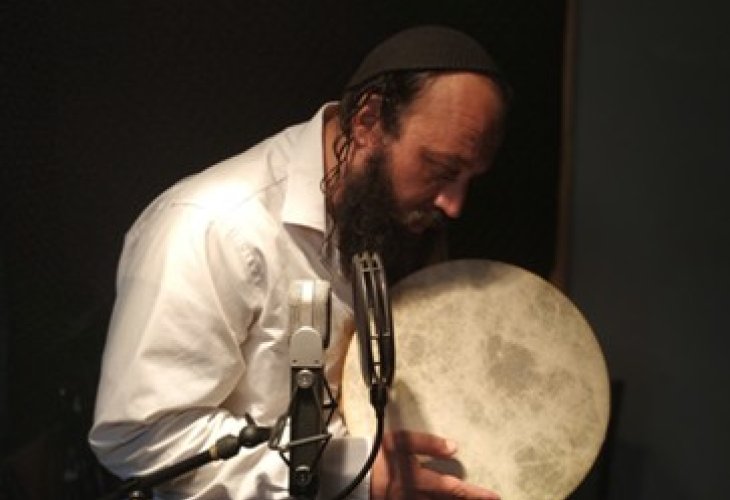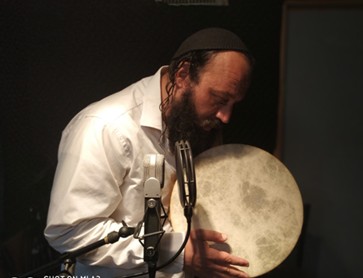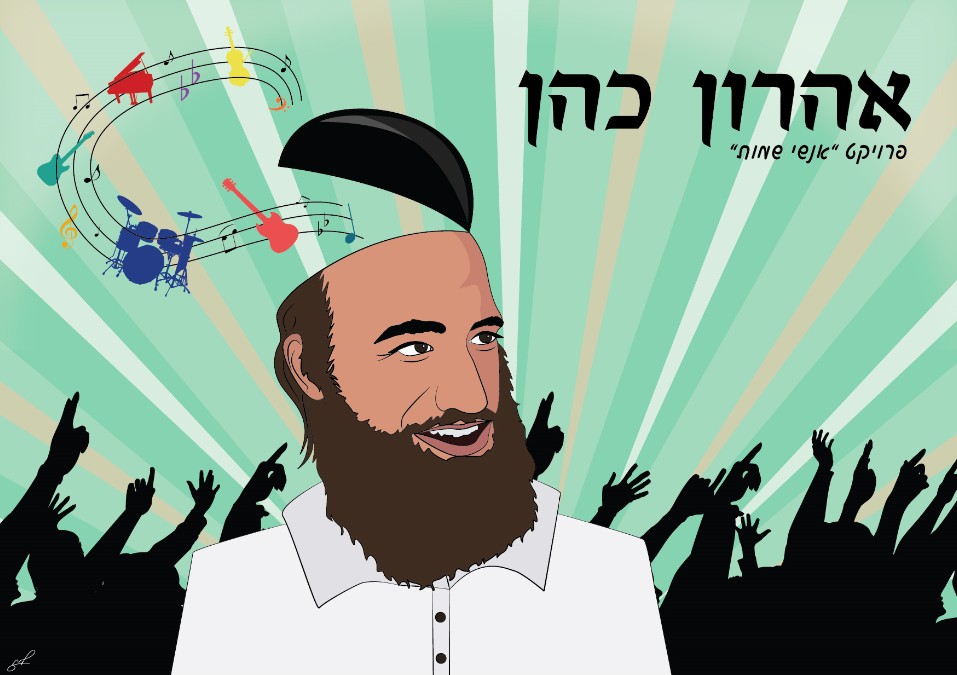Aaron Cohen: "After Returning to Faith, I Didn't Believe I'd Perform Again, But It Happened"
Aaron Cohen worked in music for years and started a band, but after returning to faith and becoming a devout scholar, he left his past activities behind. Now, six years later, he's back in music, this time with a Jewish touch. What surprise awaited him? The Song of His Life

From childhood, Aaron Cohen remembers himself as participating in all areas of the performing arts. He wrote music for artists, acted in plays, drummed at events, and later formed a music band that became well-known. "The names," it was called, characterized by Indian rock music. At that time, Aaron insisted on writing the songs exclusively in English. Why in English? "Because it sounded the most unique and professional to me," he explains. The band was highly successful, performing on numerous stages and even producing an album.
Today he is 42, and essentially nothing has changed. He continues to create music and perform across the country, only this time he does it from the other side of the spectrum, with holiness and purity. This week (Tuesday, 17th of Tevet), he is set to perform at the Gula Junction in Petah Tikva. "It's not the first time I'm performing as a devout scholar wearing a kippah, but each time it excites me anew," he says sincerely.

Men of Names
Twenty years ago, during the time Aaron performed with his former band, he had a music partner named Yonatan. Together, they managed performances and even wrote songs. However, after some time, Cohen's life changed, his father passed away, and a series of events led him to dissolve the partnership with that partner.
"One day during the shiv'ah for my father, a rabbi I knew came to comfort me and suggested organizing a class in memory of my father," he recalls. "The idea appealed to me, and from that moment on, I started holding a regular class. After several such classes were given, I began to feel a change in life. My feeling was that I was not living in the right place and this was not how I wanted to see myself in the years to come. I am sure the holy Torah played a part in the significant change that happened in me; it caused me to return to the Father in heaven."
Aaron emphasizes that until that day, he was not connected to Judaism at all. "For years I didn't make Kiddush and didn't even fast on Yom Kippur. Granted, six years before returning to faith, I began fasting on Yom Kippur and laying tefillin, but before that, there was nothing—no holidays, no Shabbat, no kashrut. These are things I didn't even know existed."
The change didn't happen in a single moment, but after a period where Aaron realized where he was headed, he left music and joined a kollel to study with a partner. Later, he began working in marketing and combined Torah learning with work.
But apparently, the love for music continued to burn within him, leading him, two years later, to accept an offer to join the 'Playback' theater, performing before religious audiences, which he did with joy. Soon after, he founded a home with his wife Naomi, who also returned to faith.
"I always knew Naomi loved songs and was connected to them," he says, "but I never imagined she knew how to write and compose. Suddenly, one day, she showed me a folder with songs she had written—unique songs full of emotion and faith." At those moments, he again felt the beloved tickle of composing and singing that he had missed. "I remembered the band I once had and the creations I made. I asked my wife what she thought about composing some of her songs and releasing them in a joint album. She was enthusiastic. So we took the songs, arranged them, recorded them, invested in them, and eventually released an amazing album that sold 1,000 copies. As a result, I also went out to various performances, and suddenly I returned to the world of music and creation, only this time from the other side."

Same Lady, Different Dress
For a time, Aaron lived with his family in the Haredi settlement of Tifrah, in Rabbi Tunik's community. During the day, he studied in a kollel, and in the evenings, he went out to strengthen the Jews of Sderot and the area and even taught Torah lessons there.
"One day, my wife asked me to leave the settlement to buy some things, and when I stood at the hitchhiking station trying to catch a ride, a car stopped next to me, which I later discovered was full of cameras. It turned out there were people inside from a well-known TV series who were asking to pick up hitchhikers and film them. Initially, I was frightened, but then I thought this could actually be a Kiddush Hashem. So I stayed in the car and spoke with the driver. A certain period later, I found out the segment was aired, and very many people watched it. Among others, Yonatan, my former partner, was surprised to see how I changed and what was happening with me. He contacted me and after an emotional conversation as two old friends, it became clear that he wanted to join me again and work together with holiness and purity."
Interestingly, one of Cohen's leading songs in his performances is built from the supplication prayers of Rabbi Yehuda Halevi, where the phrase 'Men of Names' appears. Cohen composed the text while remembering his band "The names" through which he performed in the past. "Coincidentally, the names are so similar," he says, "and that led me to decide that the name of my album would be 'Men of Names'.
"Now we no longer write music in English," he stresses, "but only use the Hebrew language and rely heavily on the texts of Rabbi Nachman, Yehuda Halevi, and expressions of the soul in general. My wife writes a significant portion of the songs, and some I write. On the other hand, the style of music remains the same, and I feel a mission to bring this unique style of Jewish indie rock to the religious public."
When Cohen talks about the music he creates, he notes an interesting point: "Once I spoke to someone and told them that after six years of not believing I would return to music, suddenly I did. He told me something so precise: 'Your talent is a gift you've received, and you cannot run away from gifts."
He pauses for a moment and then adds: "I completely believe that when I arrive in heaven one day, they will ask me: 'You received a gift in your hands, how did you use it to spread Hashem's name in the world? What did you do with your talent to benefit the people of Israel?' And that is my aspiration—to merit using the gift I've received in the right way, to glorify Hashem's name."

